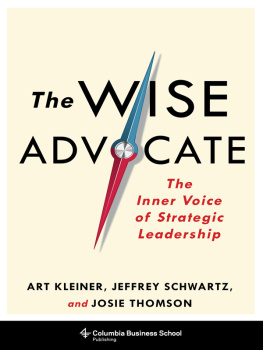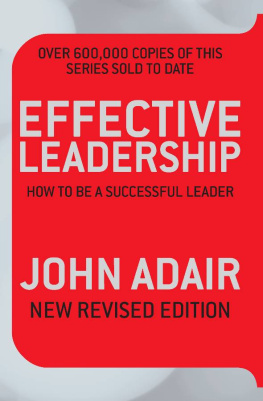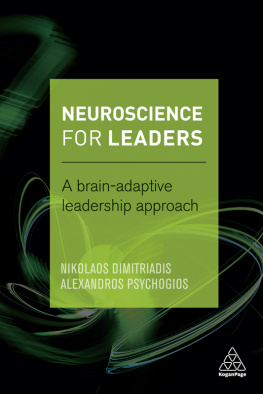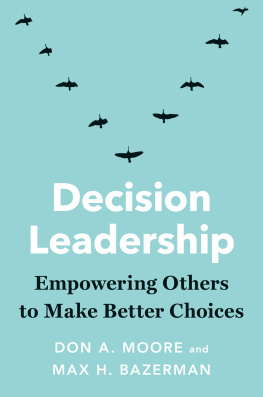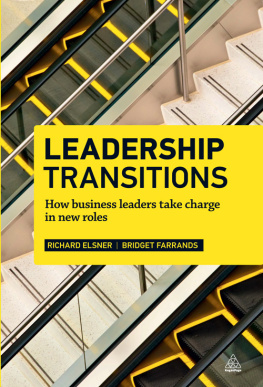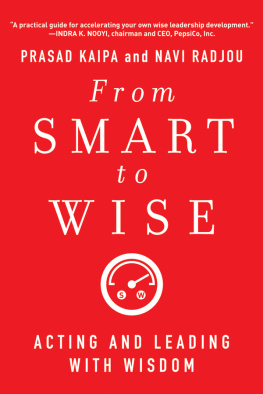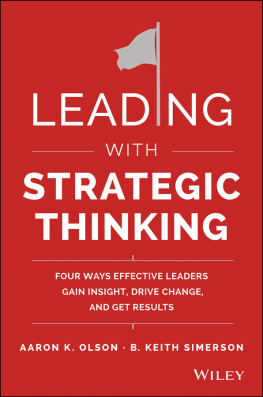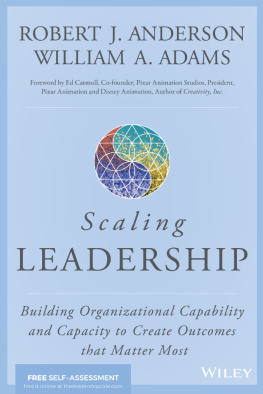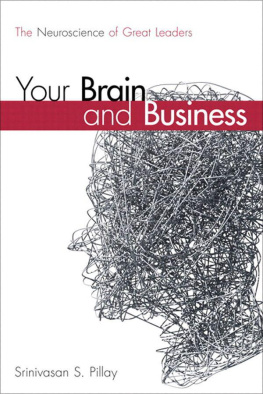Table of Contents
The Wise Advocate
Columbia University Press
Publishers Since 1893
New York Chichester, West Sussex
cup.columbia.edu
Copyright 2019 Arthur Kleiner, Jeffrey M. Schwartz, Josephine A. Thomson
All rights reserved
E-ISBN 978-0-231-54586-0
Library of Congress Cataloging-in-Publication Data
Names: Kleiner, Art, author. | Schwartz, Jeffrey, 1951 author. | Thomson, Josie, author.
Title: The wise advocate: the inner voice of strategic leadership / Art Kleiner, Jeffrey Schwartz, and Josie Thomson.
Description: New York: Columbia University Press, [2019] | Includes bibliographical references and index.
Identifiers: LCCN 2018026093 (print) | LCCN 2018038810 (e-book) | ISBN 9780231545860 (e-book) | ISBN 9780231178044 (cloth: alk. paper)
Subjects: LCSH: LeadershipPsychological aspects. | ManagementPsychological aspects.
Classification: LCC HD57.7 (e-book) | LCC HD57.7 .K548 2019 (print) | DDC 658.4/092dc23
LC record available at https://lccn.loc.gov/2018026093
A Columbia University Press E-book.
CUP would be pleased to hear about your reading experience with this e-book at .
Cover design: Noah Arlow
Contents
HAVE YOU EVER had a difficult executive decision to make? This is the kind of decision where the best options arent obvious, the consequences arent crystal clear, and the outcome could affect hundreds of people or more. Each of these moments of choice is a potential turning pointit may move your organization, or you personally, across a threshold you havent crossed before.
Maybe youre the leader of a company. You have a great innovation in mind, but it would mean taking on so much debt youd practically be betting the company on this venture. Or youre asked to oversee a round of layoffs, and you must decide who stays and who goes. Or youre an up-and-coming entrepreneur. Someone offers you a lucrative deal, but you must change the way you operate, and youre not sure you and your colleagues are up to the task. Or you are asked to cross an ethical line: to pay a bribe, adjust some data to make the outcome look better, or hire a friend or relative when there are other, better candidates.
Some of these difficult choices may come up outside the workplace as well. In deciding which job to take, where to send your children to school, whether to change your home, how to handle a debilitating disease, what to do about a struggling marriage, how to think about a relative or friend who is under great stress, or in many other life situations, you may find yourself facing a dilemma you never planned for, deciding among uncertain alternatives. Sometimes it may feel as though the only expedient choice is morally questionable; at other times, you may be desperate and feel as though you have no choice at all. At still other timesat work or at homea dramatic new opportunity may beckon, but you feel timid about it. You dont know exactly what will happen, and you have to take a leap of faith no matter what you do; even standing still and not taking any action is a sort of decision.
In the face of such uncertainty, how do you figure out the right thing to do? Once you figure it out, how do you set yourself up so that things turn out well after you make the choice? Most important, how do you develop the habit of making better choices, time and time again, even in difficult and uncertain circumstances?
No book can answer these questions completely, of course. The best choice is always specific to the situation. But all major decisionswhether a significant business move or a deliberate life changehave one thing in common. At the moment of making the choice, certain things happen in the human mind and brain that can, if you pay attention appropriately, help you make better decisions in the future. Moreover, if you manage this type of decision in the right way, time and time again, you can become one of those rare people known as strategic leaderspeople who can help a group, an enterprise, or a country transcend its limits and move closer to fulfilling its most significant aspirations.
Neuroscientists and psychologists have studied the mind (the locus of mental activity) and the brain (the physical organ associated with that activity) in ways that illuminate these critical moments of choice. The results of their studiesalong with insights from organizational research and observationhave illuminated the neural dynamics of people in leadership roles. Insights about neuroscience and leadership are emerging from many places, and they all point to the same relationship among decision-making habits, recurring mental activity, and this quality of strategic leadershipthe ability to address problems that are too complex for an organization to manage easily. A strategic leader gains legitimacy by helping the organization transcend its limits and move toward more profound and powerful levels of capability. This requires being able to inspire others, help groups consider new possibilities, and bring enterprises toward lofty, beneficial goals.
In this book, the relationship between the human mind and brain is central to strategic leadership. We define the mind as an ongoing pattern of mental activity associated with the self, and especially with the conscious choices and decisions made by any human being. The brain is the biological organ in the skull where neurons and other cells process and transmit sensations, feelings, thoughts, and emotions. The mind is activethe source of choices and decisions you make about how and where to focus your attention. The brain is affected by these choices and decisions, and the more capable you become at recognizing and managing your brains reactions, the easier it becomes to focus your attention effectively. That leads to the simple concept at the heart of this book: The focus of your attention determines what happens in the mind and the brain during these critical moments of choice, and determines what kind of a leader you can be.
As we explain this concept, we will also explore some fundamental questionsquestions that are still the subject of ongoing active neuroscience researchabout the mutual influence and impact of the brain and mind on each other. But all this complexity comes down to the fact that in most instances, you are likely to focus your attention in one of only two basic ways. We call them the Low Ground and High Ground, and they can lead you, respectively, toward transactional or strategic leadership.
The Nature of Strategic Leadership
The concept of strategic leadership has a rich, broad conceptual lineage that goes back to Homer and Plato. In recent years, it can be traced to General George C. Marshall and his successors at the U.S. Army War College; These theories all share two core themes that we think are significant for anyone who is trying to have an effect on the world around her or him.
First, the pattern of mental activityor, more loosely, the way you think and behavematters. This starts with the observation, obvious but profound, that different people placed in the same roleat the top of a government, an enterprise, a church, a group, or a countrycan lead the organization down very different paths. Moreover, a successful leader of one organization will often (but not always) generate success at another. Why, then, do some people lead groups to thrive, while others take them to decline? The history of leadership theory is a search for answers. What they all have in common is the importance of the leaders mental activity, manifest in what they say, what they do, and most subtle but most important, how and where they focus their attention.

